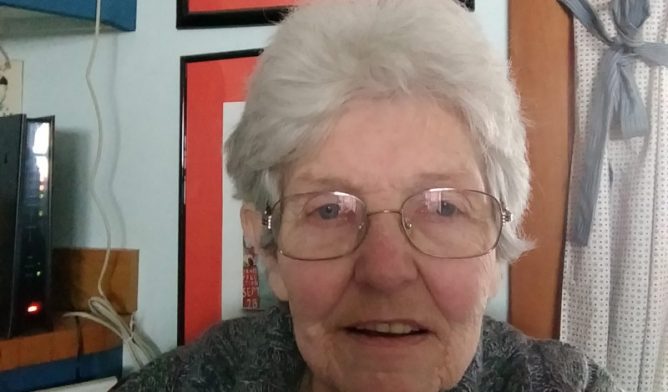Keytruda for Mesothelioma: My Firsthand Experience
Treatment & DoctorsWritten by Emily Ward | Edited By Walter Pacheco

I started taking Keytruda April 23. It was plan B after my second mesothelioma recurrence and a bad experience with my third round of chemotherapy.
Two treatments in, I feel good. Just the other day, I was able to paint both of my decks, spray my yard for bugs and do some gardening.
My next infusion is June 4, and I go for my first scan July 2 to see if Keytruda is working.
I made the decision to begin Keytruda because the chemotherapy was taking too much of a toll on my body. I was bedridden for nearly a week after my last round of chemo. Scans showed the Alimta was preventing cancer growth, but the decrease in quality of life wasn’t worth it for me.
Luckily, my medical oncologist Dr. David Jackman shares my value for quality of life and doesn’t force anything on his patients. How I feel is important to him.
The infusions themselves are painless. The Keytruda is mixed with a little more fluid than the Alimta I usually take, so the infusions take about 15 minutes longer.
So far, I’ve experienced no side effects from Keytruda. I was a little tired the day after my first infusion, but I chalk that up to the long drive to Dana-Farber in Boston and waking up at the crack of dawn.
Hopefully Keytruda can give me quality of life as well as longevity, but the beauty is I can go back on chemotherapy if it doesn’t work.
Major Differences Between Immunotherapy and Chemotherapy
There are still a lot of unknowns with immunotherapy.
About the only similarity between Keytruda and chemotherapy is that you take both through an IV.
If you’re going to experience side effects from chemotherapy, you’re usually going to get them soon after the first treatment.
With Keytruda and other immunotherapy drugs, side effects can happen on the first treatment, the 15th treatment or never. There’s really no telling, and it varies for every patient.
Chemotherapy has been around so long that doctors know what to expect. That’s not the case with immunotherapy. Doctors have to be very careful when educating patients.
I was handed four pieces of paper — all with similar information — during my first 30-minute Keytruda infusion. I now carry around a card that says I’m on Keytruda.
You have to let everyone in the world know — your family, your primary health care providers, your pharmacist — everybody. The major concern is taking corticosteroids because those drugs can interfere with the effectiveness of immunotherapy.
When Dr. Jackman explained the side effects that I may experience, it suddenly clicked for the nurse in me. You’re looking for any of the “itises”: Colitis, pneumonitis, gastritis, any condition that refers to the inflammation of tissues.
And unlike chemotherapy, side effects from immunotherapy aren’t always apparent. They often can be mistaken as a cold or the flu.
If you experience cold-like symptoms while taking Keytruda, you need to see a doctor immediately because something could be seriously wrong.
Keytruda Still Not Easily Accessible to Mesothelioma Patients
I was lucky that I’ve been receiving treatment in Boston since I was diagnosed in 2012. But many mesothelioma patients don’t have access to the best cancer centers in America.
Keytruda isn’t approved yet by the FDA to treat mesothelioma. Dana-Farber is one of a handful of specialty centers in the U.S. where patients like me can get Keytruda. I’m not sure if I would have access to it in my home state of Maine.
Cancer centers such as Dana-Farber are selected to provide important clinical data to help get Keytruda approved for more cancers.
Right away, I was handed a research form and asked if I was willing to have my results included in a study.
Blood samples, access to biopsy samples and other scan data are needed to prove the drug is working. It’s an important part of the approval process for potentially life-saving treatments such as Keytruda.
Unfortunately, many mesothelioma patients don’t have the Dana-Farbers and Dr. Jackmans in their corner. There are patients who are on waiting lists for Keytruda clinical trials.
Here’s a drug that could positively impact their survival, and they’re stuck in line waiting. It’s heartbreaking.
Stories like this remind me how fortunate I am. I drive almost three hours with traffic to Dana-Farber, but that is much closer than many people are to top-notch hospitals and the latest treatments such as immunotherapy.
Hopefully, we won’t have to wait too long before more patients have access to it. It has great potential to save lives.
In July, we’ll see if it’s working for me.






